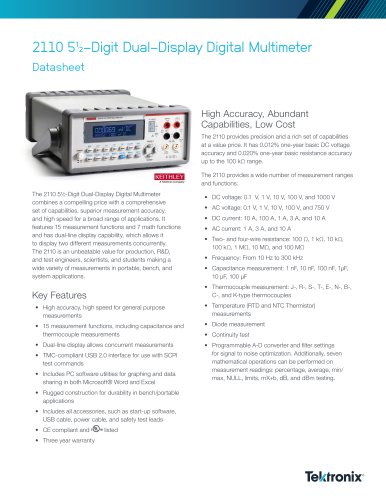
Low Level Measurements Handbook: Precision DC Current, Voltage, and Resistance Measurements
1 /
43ページ
カタログの抜粋
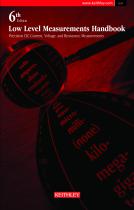
Low Level Measurements Handbook Precision DC Current, Voltage, and Resistance Measurements Low Level Measurements Handbook Specifications are subject to change without notice. All Keithley trademarks and trade names are the property of Keithley Instruments, Inc. All other trademarks and trade names are the property of their respective companies. © Copyright 2004 Keithley Instruments, Inc. Printed in U.S.A. Keithley Instruments, Inc. Corporate Headquarters • 28775 Aurora Road • Cleveland, Ohio 44139 • 440-248-0400 • Fax: 440-248-6168 • 1-888-KEITHLEY (534-8453) • www.keithley.com
カタログの1ページ目を開く
“To get a free electronic version of this book, visit Keithley’s Knowledge Center web page.” a g r e at e r m e a s u r e o f c o n f i d e n c e
カタログの2ページ目を開く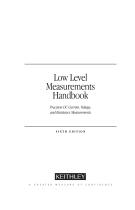
Low Level Measurements Handbook Precision DC Current, Voltage, and Resistance Measurements SIXTH EDITION
カタログの3ページ目を開く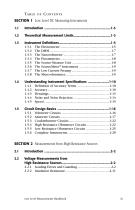
SECTION 1 Low Level DC Measuring Instruments 1.1 SECTION 2 Measurements from High Resistance Sources 2.1 Low Level Measurements Handbook
カタログの4ページ目を開く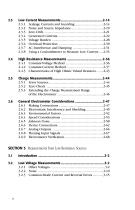
SECTION 3 Measurements from Low Resistance Sources 3.1
カタログの5ページ目を開く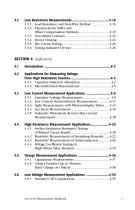
Low Level Measurements Handbook
カタログの6ページ目を開く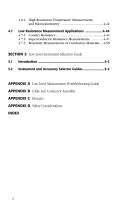
SECTION 5 Low Level Instrument Selection Guide 5.1 APPENDIX A Low Level Measurement Troubleshooting Guide APPENDIX B Cable and Connector Assembly APPENDIX C Glossary APPENDIX D Safety Considerations INDEX
カタログの7ページ目を開く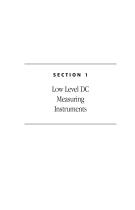
Low Level DC Measuring Instruments
カタログの8ページ目を開く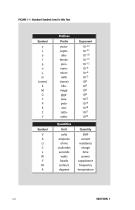
FIGURE 1-1: Standard Symbols Used in this Text Prefixes Symbol yoctozeptoattofemtopiconanomicromilli(none) kilomegagigaterapetaexazettayotta- Quantities Symbol Unit volts amperes ohms coulombs seconds watts farads cycles/s degrees EMF current resistance charge time power capacitance frequency temperature
カタログの9ページ目を開く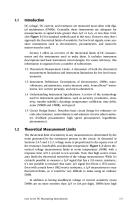
Introduction DC voltage, DC current, and resistance are measured most often with digital multimeters (DMMs). Generally, these instruments are adequate for measurements at signal levels greater than 1µV or 1µA, or less than 1GΩ. (See Figure 1-1 for standard symbols used in this text.) However, they don’t approach the theoretical limits of sensitivity. For low level signals, more sensitive instruments such as electrometers, picoammeters, and nanovoltmeters must be used. Section 1 offers an overview of the theoretical limits of DC measurements and the instruments used to make them. It includes...
カタログの10ページ目を開く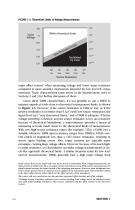
FIGURE 1-2: Theoretical Limits of Voltage Measurements 103 Noise Voltage Within theoretical limits Source Resistance input offset current1 when measuring voltage and lower input resistance compared to more sensitive instruments intended for low level DC measurements. These characteristics cause errors in the measurement; refer to Sections 2 and 3 for further discussion of them. Given these DMM characteristics, it’s not possible to use a DMM to measure signals at levels close to theoretical measurement limits, as shown in Figure 1-3. However, if the source resistance is 1MΩ or less, or if...
カタログの11ページ目を開く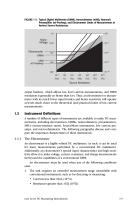
FIGURE 1-3: Typical Digital Multimeter (DMM), Nanovoltmeter (nVM), Nanovolt Preamplifier (nV PreAmp), and Electrometer Limits of Measurement at Various Source Resistances 100 Noise Voltage Source Resistance (input burden), which affects low level current measurements, and DMM resolution is generally no better than 1nA. Thus, an electrometer or picoammeter with its much lower input burden and better sensitivity will operate at levels much closer to the theoretical (and practical) limits of low current measurements. Instrument Definitions A number of different types of instruments are...
カタログの12ページ目を開く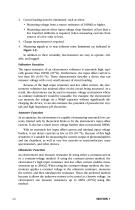
2. Circuit loading must be minimized, such as when: • Measuring voltage from a source resistance of 100MΩ or higher. • Measuring current when input voltage drop (burden) of less than a few hundred millivolts is required (when measuring currents from sources of a few volts or less). 3. Charge measurement is required. 4. Measuring signals at or near Johnson noise limitations (as indicated in Figure 1-2). In addition to their versatility, electrometers are easy to operate, reliable, and rugged. Voltmeter Function The input resistance of an electrometer voltmeter is extremely high, typically...
カタログの13ページ目を開く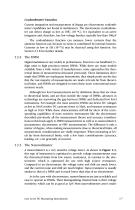
Coulombmeter Function Current integration and measurement of charge are electrometer coulombmeter capabilities not found in multimeters. The electrometer coulombmeter can detect charge as low as 10fC (10–14C). It’s equivalent to an active integrator and, therefore, has low voltage burden, typically less than 100µV. The coulombmeter function can measure lower currents than the ammeter function can, because no noise is contributed by internal resistors. Currents as low as 1fA (10–15A) may be detected using this function. See Section 2.3.8 for further details. 1.3.2 The DMM Digital multimeters...
カタログの14ページ目を開く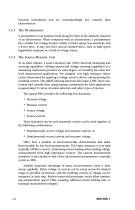
function instruments and are correspondingly less complex than electrometers. 1.3.4 The Picoammeter A picoammeter is an ammeter built along the lines of the ammeter function of an electrometer. When compared with an electrometer, a picoammeter has a similar low voltage burden, similar or faster speed, less sensitivity, and a lower price. It may also have special characteristics, such as high speed logarithmic response or a built-in voltage source. 1.3.5 The Source-Measure Unit As its name implies, a source-measure unit (SMU) has both measuring and sourcing capabilities. Adding current and...
カタログの15ページ目を開く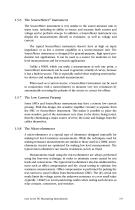
1.3.6 The SourceMeter® Instrument The SourceMeter instrument is very similar to the source-measure unit in many ways, including its ability to source and measure both current and voltage and to perform sweeps. In addition, a SourceMeter instrument can display the measurements directly in resistance, as well as voltage and current. The typical SourceMeter instrument doesn’t have as high an input impedance or as low a current capability as a source-measure unit. The SourceMeter instrument is designed for general-purpose, high speed production test applications. It can be used as a source for...
カタログの16ページ目を開く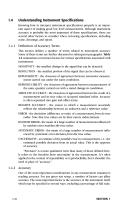
Understanding Instrument Specifications Knowing how to interpret instrument specifications properly is an important aspect of making good low level measurements. Although instrument accuracy is probably the most important of these specifications, there are several other factors to consider when reviewing specifications, including noise, deratings, and speed. 1.4.1 Definition of Accuracy Terms This section defines a number of terms related to instrument accuracy. Some of these terms are further discussed in subsequent paragraphs. Table 1-1 summarizes conversion factors for various...
カタログの17ページ目を開くKeithley Instruments/ケースレーのすべてのカタログと技術パンフレット
-
6220-6221
5 ページ
-
6482
3 ページ
-
2520
8 ページ
-
2606B
13 ページ
-
2601B
20 ページ
-
AFG1000 Series
13 ページ
-
2182A Nanovoltmeter
6 ページ
-
6 Series B MSO
69 ページ
-
TBS1000B-EDU Series
14 ページ
-
3 Series MDO
36 ページ
-
4 Series MSO
40 ページ
-
TSG4100A Series
24 ページ
-
RTPA2A
6 ページ
-
TPA-N-PRE Datasheet
4 ページ
-
DPO7000 Series Datasheet
28 ページ
-
10G-KR Datasheet
8 ページ
-
AWG4000 Series Datasheet
20 ページ
-
TLA6400 Series Datasheet
14 ページ
-
4200-SCS
16 ページ








